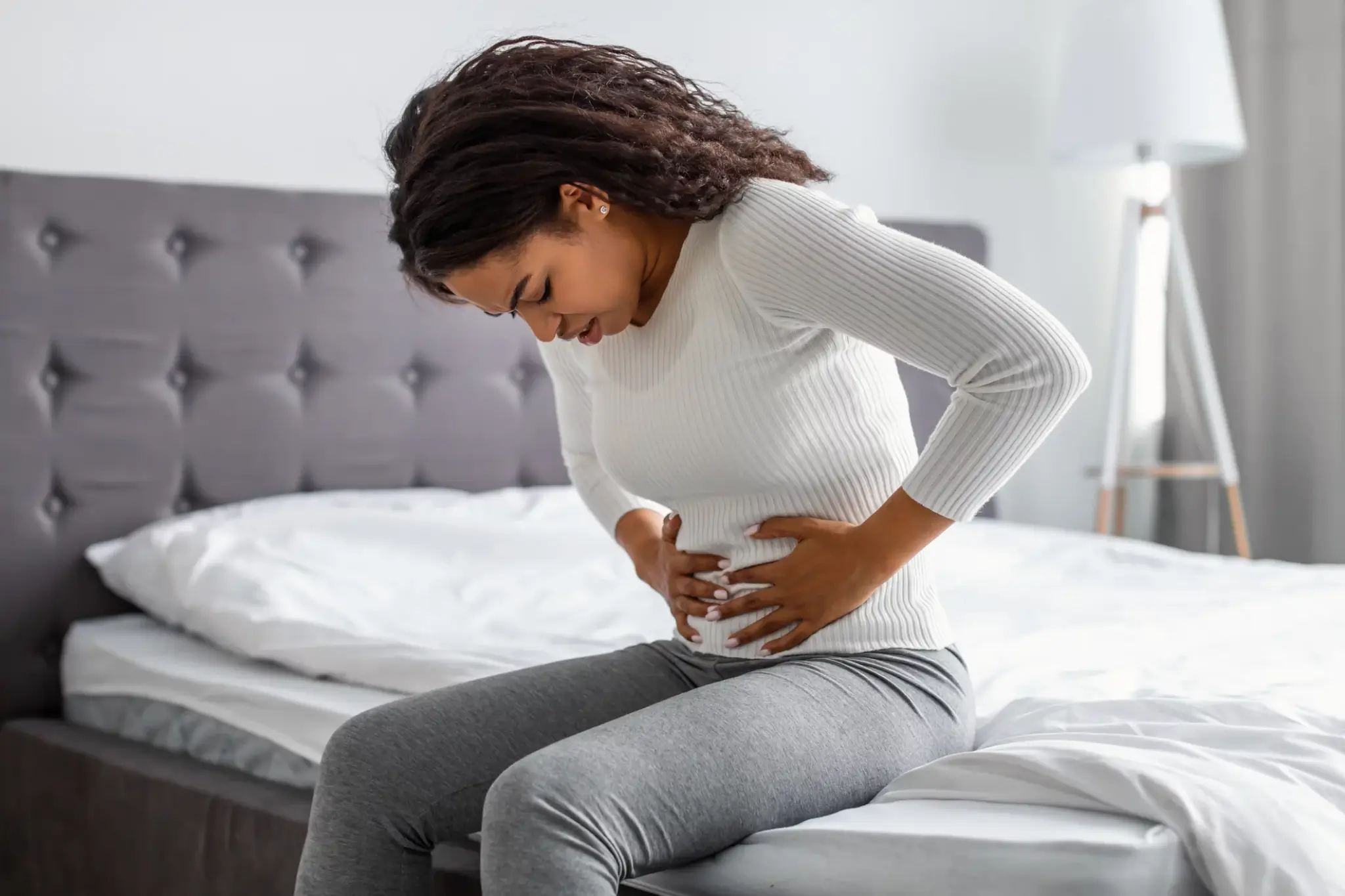Soothe Endometriosis Symptoms With These 5 Simple Dietary Changes
Chances are you or someone you know has endometriosis, a notoriously painful and chronic condition that can negatively impact quality of life with symptoms like heavy periods, fertility problems, and countless other health issues. Nutrition & lifestyle have always played a central role in promoting optimal health. In the case of endometriosis, the right type of diet can significantly improve symptoms like pain, and may even be able to address conditions like irritable bowel syndrome, which is common with endometriosis. Learn more about conditions we treat: Endometriosis How does diet affect endometriosis? Diet helps manage endometriosis by regulating inflammation and estrogen levels in the body. Endometriosis is an inflammatory condition that occurs when endometrial tissue, which normally only resides inside the uterus, is located elsewhere in the abdomen, like the ovaries, intestines, or even the bladder. Endometrial tissue, no matter where it’s located in your body, then responds to the same hormonal changes that your period does. This can cause debilitating pain as well as the buildup of scar tissue known as adhesions. Studies have found that a diet rich in vegetables, fruit, and healthy fats may help reduce painful endometriosis related symptoms (1). In addition, some studies have shown that certain foods containing omega-3 fatty acids, vitamin E, selenium, and zinc can help reduce inflammation and promote hormone balance. Endometriosis Gets Worse with Excess Estrogen Endometriosis is often a condition of estrogen dominance. Endometrial tissue is sensitive to estrogen, causing the tissue to thicken and spread. This leads to more inflammation and pain as the condition progresses. While doctors are still working to understand what triggers endometriosis initially, we do know there is a link between endometriosis and estrogen dominance. Factors that contribute to excess estrogen are: Stress Poor diet Leaky gut or dysbiosis Environmental toxins PCOS Related: 10 Signs You Have Estrogen Dominance Anti-inflammatory endometriosis diet The most important part of an endo diet is to avoid inflammatory foods, and prioritize eating anti-inflammatory foods. Certain nutrients can also help metabolize excess estrogen. Eat more fiber-rich foods Estrogen leaves the body via bowel movements, so getting enough fiber is key to promoting the regularity that helps detox excess estrogen (2). If you regularly experience constipation (not having a comfortable bowel movement every day), you likely have excess estrogen that could be worsening endometriosis symptoms. Women should aim for 25 grams of fiber per day, with plenty of water. The easiest way to do this is stick to a whole-foods diet with an abundance of plant-based foods. The most fiber-rich fruits and vegetables include broccoli, pears, raspberries, lentils. If you’re in need of more fiber, try adding ground flax seeds to a smoothie or oatmeal. Get pre- and probiotics Friendly bacteria in the gut promote healthy estrogen levels, and reduce the number of bad bacteria that convert estrogen into more damaging forms. These friendly bacteria also support overall digestive function, help resolve inflammation, and absorb nutrients. Fuel your microbiome with prebiotics such as fiber, and probiotics—which are live bacteria found in fermented foods like kimchi, kefir, yogurt, kombucha, and miso. Learn more: Healing Your Gut After Antibiotics—4 Steps Focus on anti-inflammatory fats The omega-3 fatty acids eicosapentaenoic acid (EPA) and docosahexaenoic acid (DHA) fight inflammation in the body, which is why they are important for endometriosis (3). These foods are also important sources of other nutrients like zinc, selenium, and vitamin A. Good food sources of omega-3s include: Cold water fish & seafood such as salmon, tuna, mackerel, mussels, and oysters Grass-fed beef and lamb Pasture-raised eggs Olives & olive oil Avocado & avocado oil Flaxseeds, pumpkin seeds, hemp seeds Adding an omega-3 supplement to your diet can also help reduce inflammation. Eat more broccoli, cauliflower, & Brussels sprouts Cruciferous vegetables are naturally rich in a sulfur-containing compound called diindolylmethane or DIM. DIM supports the function of liver enzymes that assist in estrogen metabolism. Avoiding estrogen dominance is important to reduce pain and painful periods associated with PMS. Cruciferous veggies also contain indole-3-carbinol, or I3C. IC3 has been shown to reduce how much estrogen is available in the body by promoting detoxification (4). These vegetables are also a great source of fiber and vitamins necessary for hormone balance. Aim for about 1-2 cups of cooked cruciferous vegetables per day. Up your antioxidants A diet high in antioxidants may help reduce endometriosis symptoms. One study examined the effects of an antioxidant cocktail containing n-acetyl cysteine, alpha lipoic acid, bromelain, and zinc to control endometriosis-as

Chances are you or someone you know has endometriosis, a notoriously painful and chronic condition that can negatively impact quality of life with symptoms like heavy periods, fertility problems, and countless other health issues.
Nutrition & lifestyle have always played a central role in promoting optimal health. In the case of endometriosis, the right type of diet can significantly improve symptoms like pain, and may even be able to address conditions like irritable bowel syndrome, which is common with endometriosis.
How does diet affect endometriosis?
Diet helps manage endometriosis by regulating inflammation and estrogen levels in the body. Endometriosis is an inflammatory condition that occurs when endometrial tissue, which normally only resides inside the uterus, is located elsewhere in the abdomen, like the ovaries, intestines, or even the bladder.
Endometrial tissue, no matter where it’s located in your body, then responds to the same hormonal changes that your period does. This can cause debilitating pain as well as the buildup of scar tissue known as adhesions.
Studies have found that a diet rich in vegetables, fruit, and healthy fats may help reduce painful endometriosis related symptoms (1). In addition, some studies have shown that certain foods containing omega-3 fatty acids, vitamin E, selenium, and zinc can help reduce inflammation and promote hormone balance.
Endometriosis Gets Worse with Excess Estrogen
Endometriosis is often a condition of estrogen dominance. Endometrial tissue is sensitive to estrogen, causing the tissue to thicken and spread. This leads to more inflammation and pain as the condition progresses.
While doctors are still working to understand what triggers endometriosis initially, we do know there is a link between endometriosis and estrogen dominance.
Factors that contribute to excess estrogen are:
- Stress
- Poor diet
- Leaky gut or dysbiosis
- Environmental toxins
- PCOS
Related: 10 Signs You Have Estrogen Dominance
Anti-inflammatory endometriosis diet
The most important part of an endo diet is to avoid inflammatory foods, and prioritize eating anti-inflammatory foods. Certain nutrients can also help metabolize excess estrogen.
Eat more fiber-rich foods
Estrogen leaves the body via bowel movements, so getting enough fiber is key to promoting the regularity that helps detox excess estrogen (2). If you regularly experience constipation (not having a comfortable bowel movement every day), you likely have excess estrogen that could be worsening endometriosis symptoms.
Women should aim for 25 grams of fiber per day, with plenty of water. The easiest way to do this is stick to a whole-foods diet with an abundance of plant-based foods. The most fiber-rich fruits and vegetables include broccoli, pears, raspberries, lentils. If you’re in need of more fiber, try adding ground flax seeds to a smoothie or oatmeal.
Get pre- and probiotics
Friendly bacteria in the gut promote healthy estrogen levels, and reduce the number of bad bacteria that convert estrogen into more damaging forms.
These friendly bacteria also support overall digestive function, help resolve inflammation, and absorb nutrients. Fuel your microbiome with prebiotics such as fiber, and probiotics—which are live bacteria found in fermented foods like kimchi, kefir, yogurt, kombucha, and miso.
Learn more: Healing Your Gut After Antibiotics—4 Steps
Focus on anti-inflammatory fats
The omega-3 fatty acids eicosapentaenoic acid (EPA) and docosahexaenoic acid (DHA) fight inflammation in the body, which is why they are important for endometriosis (3). These foods are also important sources of other nutrients like zinc, selenium, and vitamin A.
Good food sources of omega-3s include:
- Cold water fish & seafood such as salmon, tuna, mackerel, mussels, and oysters
- Grass-fed beef and lamb
- Pasture-raised eggs
- Olives & olive oil
- Avocado & avocado oil
- Flaxseeds, pumpkin seeds, hemp seeds
Adding an omega-3 supplement to your diet can also help reduce inflammation.
Eat more broccoli, cauliflower, & Brussels sprouts
Cruciferous vegetables are naturally rich in a sulfur-containing compound called diindolylmethane or DIM. DIM supports the function of liver enzymes that assist in estrogen metabolism. Avoiding estrogen dominance is important to reduce pain and painful periods associated with PMS. Cruciferous veggies also contain
indole-3-carbinol, or I3C. IC3 has been shown to reduce how much estrogen is available in the body by promoting detoxification (4). These vegetables are also a great source of fiber and vitamins necessary for hormone balance. Aim for about 1-2 cups of cooked cruciferous vegetables per day.
Up your antioxidants
A diet high in antioxidants may help reduce endometriosis symptoms. One study examined the effects of an antioxidant cocktail containing n-acetyl cysteine, alpha lipoic acid, bromelain, and zinc to control endometriosis-associated pelvic pain. The results showed the combination of antioxidants improved the pain score in 91% of women with severe pain and 67% of those with moderate pain (5).
Foods rich in antioxidants are berries, beets, artichokes, cherries, leafy greens, and even dark chocolate.
Foods to avoid
You should avoid inflammatory foods, or foods that slow down estrogen detox in the gut or in the liver. Foods that may promote inflammation include:
- Refined sugars & carbohydrates
- Excess caffeine and alcohol
- Ultra-processed foods
- Non-organic soy, meats, and dairy products
Symptoms of endometriosis may also improve with a gluten-free diet.












